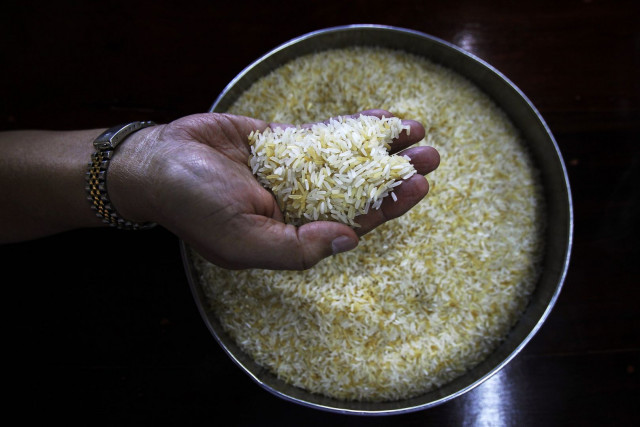Rice exporters seek grant to sideline India in European market
Most of India’s rice shipments to Europe may stop due to strict rules

Rice.
PHOTO: REUTERS
Rice Exporters Association of Pakistan (REAP) Chairman Chaudhry Sameeullah Naeem sought the assistance at a seminar organised by the association for the awareness of its members. Naeem emphasised that Pakistan could target India’s basmati rice market in the EU following upcoming application of stringent policies by the bloc to the presence of hazardous pesticides in the commodity.
From January 1, 2018, all countries that export basmati rice to the EU must bring down the maximum residue limit for Tricyclazole to 0.01mg per kg. Until now, the EU has been accepting 1mg per kg in rice shipped from different countries including India.
‘Made in Pakistan’ expo planned in UK
Naeem suggested that Pakistan could enhance rice exports to the EU from 150,000 tons to 350,000 tons by grabbing Indian exports of 200,000 tons which may be stopped due to the strict regulations.
Tricyclazole is a fungicide used by Indian farmers over more than 70% of basmati crop. But Pakistani farmers do not use such chemicals to protect their produce.
“Basmati varieties grown in Pakistan do not require the use of fungicide and we can gain from the restriction on Indian exports,” Naeem said.
India exported around 350,000 tons of rice worth $260 million to EU countries in the previous fiscal year. Of these, 70% had 1mg per kg of Tricyclazole.
He pressed the government to announce a grant to help promote Pakistani rice in the international store chains.
“Pakistan’s brand can get space by replacing Indian basmati in renowned mega stores of European states with financial support of the government,” he said. “This presents an opportunity to grab India’s market share because it will take at least two cycles to reduce the consumption of Tricyclazole.”
Naeem pointed out that basmati rice exports had been facing stiff competition from India and decried that lack of research and unavailability of new seeds had resulted in low productivity.
“High input costs have made Pakistan’s basmati totally uncompetitive,” he said and urged the government to extend financial support to the second biggest export sector in order to enable them become price competitive and bridge the widening trade deficit.
“Rice is the second biggest export sector after textiles but it has always been ignored by the government,” he remarked.
The Main Dish
Thomas Unger of Eurofins Global Control GmbH, while discussing the challenges faced by the exporters of rice to the European market, said Pakistan had a huge potential but the exporters should pay attention to meeting specifications of the importers.
“Rice exports to European countries are picking up, but exporters should pay attention to issues like aflatoxins, pesticide residue and new regulations being put in place by these markets. However, complaints of aflatoxins in rice consignments from Pakistan have dropped to almost negligible levels,” he added.
Published in The Express Tribune, November 17th, 2017.
Like Business on Facebook, follow @TribuneBiz on Twitter to stay informed and join in the conversation.


















COMMENTS
Comments are moderated and generally will be posted if they are on-topic and not abusive.
For more information, please see our Comments FAQ